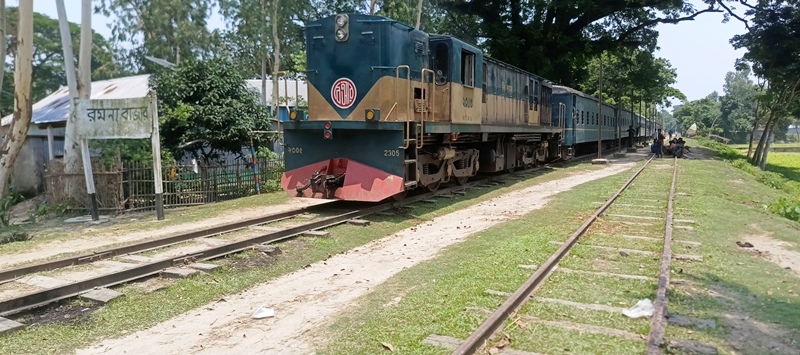- Guterres Seeks Probe Into Gaza Journalist Killings, Hunger Deaths |
- India Restricts Key Jute Imports via Land Borders |
- Rahul, Priyanka Detained in March to ECI Over ‘Vote Fraud’ |
- Five Taxpayer Groups Freed from Online Filing Obligation |
- Malaysia Rolls Out Red Carpet for Prof Yunus |
29-km Kurigram-Chilmari railway journey still takes 2.5hrs

Dilapidated rail line on the Kurigram-Chilmari section of Bangladesh Railway. UNB
By Shafique Bebu
Kurigram, Aug 12 - On a 29-kilometre stretch of railway from Chilmari to Kurigram town, time seems to stand still and not in a good way.
The journey, which should take less than half an hour, drags on for nearly two and a half hours, a stark reminder of the dilapidated condition of the Kurigram-Chilmari rail line.
A long-promised modernisation project, launched last year, has yet to deliver any tangible improvements.
Despite grand plans and budget allocations, progress has been slow to the point of near stagnation.
For locals, the frustration is growing. They feel forgotten by policymakers, watching deadlines slip while the quality of service continues to deteriorate.
At present, only a single local train runs the route each day, often late. The worn-out tracks mean trains crawl along at just 10 to 15 kilometres per hour, slower even than battery-run rickshaws, which travel almost three times as fast.
Five stations -- Kurigram, Panchpir, Ulipur, Balabari and Ramna -- lie along the Kurigram-Ramna section. Once bustling with activity, they now see dwindling passenger numbers and long waits.
At Ramna station in Chilmari, the scene is especially disheartening. Passengers stand in the sun for hours, unsure if or when the train will arrive.
“I remember when Ramna station was alive,” said 65-year-old Mofir Uddin, a long-time commuter. “There were three pairs of trains every day. Now, they barely operate. Still, we wait. Trains are the cheapest and safest way to travel,” he added.
In Chilmari, a community frequently battered by river erosion and burdened by poverty, affordable transport is not a luxury, but a necessity. For many day labourers heading to Kurigram or neighbouring towns, the train is the only viable option.
“The rail line is so bad now that commuting has become a nightmare,” said Abdus Salam, a local school teacher.
“A railway rehabilitation project was launched, but there are no visible improvements. After two deadline extensions, there’s still no progress. Chilmari has always been neglected. We don’t want to be left behind anymore,” he laments.
Salam also pointed to the mounting pressure on the Chilmari river port. “Thousands of people use the port daily. If railway services improved, it would benefit them immensely.”
Stalled Project, Rising Frustration
Bangladesh Railway records show that the Chilmari–Kurigram modernisation scheme was designed in two phases.
The Kurigram–Ulipur section (19 km) was allocated Tk 29 crore, while the Ramna–Ulipur stretch (10 km) received Tk 33.70 crore. The plan included earth-filling, protective wall construction, installation of new tracks and sleepers, and the renovation of 12 bridges and culverts.
Work was scheduled to begin in November 2023 and finish by January 2025. The deadline was first extended to June 2025, and later to December 2025.
However, the project has been hampered by severe financial constraints.
“We are facing a financial crisis,” admitted Rubel Islam, manager of the contractor, Biswas Construction Ltd. “Half of our bill from the Railway Department is still unpaid. We can’t procure essential materials, so work has stalled.
“Eighty per cent of work on the Kurigram–Ulipur section is done, but only 25 per cent of the Ramna–Ulipur stretch is complete. Had we received the full payment, the project could have progressed much faster.”
Calls for Urgent Action
Shipon Islam, Divisional Engineer of the Lalmonirhat Railway Division, acknowledged the setbacks.
“The contractor’s financial crisis is the main reason for the delay. We have been pressing them to speed up and inform higher authorities to approve the pending bills,” he said.
Despite the challenges, he expressed optimism. “We are working to complete the project by the end of this year. Once it is finished, trains will be able to run faster on this route, and additional services can be introduced.”
For now, however, the people of Chilmari remain stuck on a painfully slow track, waiting for promises to finally translate into progress. - UNB

